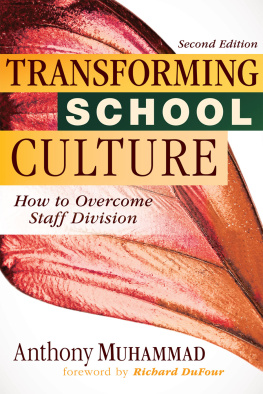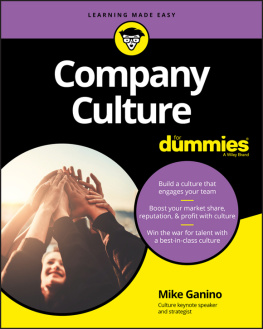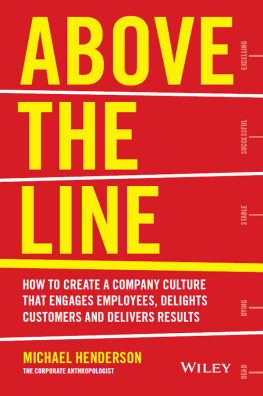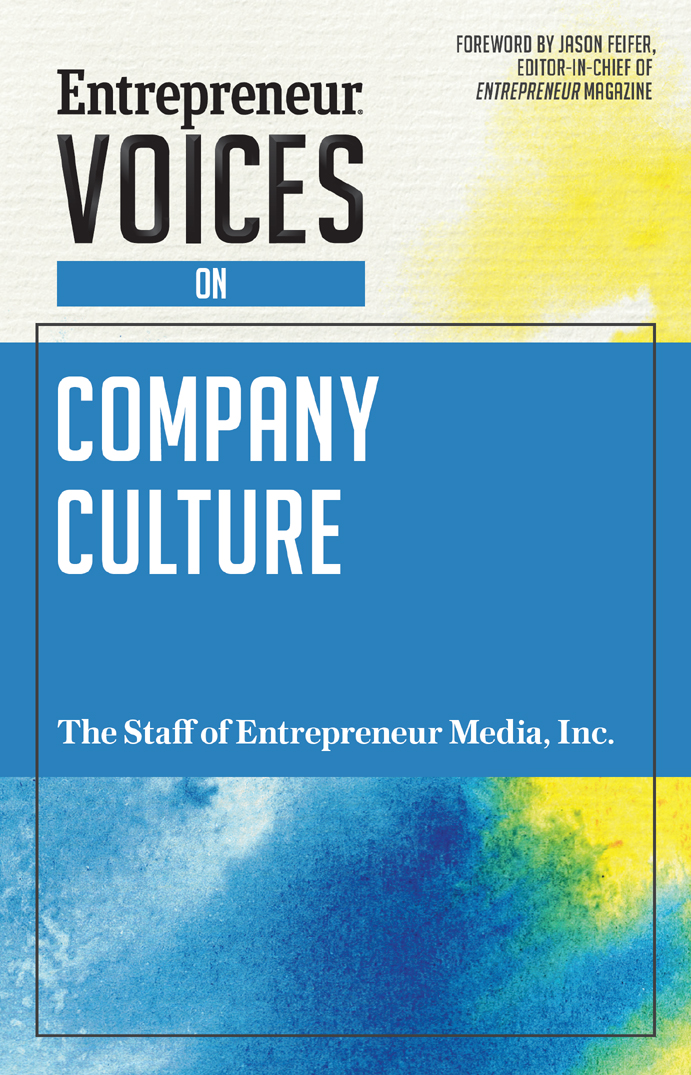
Entrepreneur Press, Publisher
Cover Design: Andrew Welyczko
Production and Composition: Eliot House Productions
2018 by Entrepreneur Media, Inc.
All rights reserved.
Reproduction or translation of any part of this work beyond that permitted by Section 107 or 108 of the 1976 United States Copyright Act without permission of the copyright owner is unlawful. Requests for permission or further information should be addressed to the Business Products Division, Entrepreneur Media Inc.
This publication is designed to provide accurate and authoritative information in regard to the subject matter covered. It is sold with the understanding that the publisher is not engaged in rendering legal, accounting or other professional services. If legal advice or other expert assistance is required, the services of a competent professional person should be sought.
ebook ISBN: 978-1-61308-386-4
Table of Contents
Guide
CONTENTS
Editor-in-Chief, Entrepreneur magazine
W hy do you like working here?
As the editor in chief of Entrepreneur, overseeing a staff of journalists and producers, its not a question Id ever flat-out ask someone on my team. Just imagine the awkwardness of thatthe manager fishing for compliments, the employee scrambling to say whatever they think the manager wants to hear. But any manager can hear employees answering that question on their own. It happens in beautiful, unexpected moments. Maybe in a meeting. Maybe in office kitchen chitchat. Maybe, frankly, at the nearby bar over happy hour. Colleagues will start trading notes about their past work experiences, and will soon circle back to their current, shared experience. Whats successful here, theyll ask? Whats not?
Listen closely in those moments. If youve built your companys culture the right way, youll already know the answers to those questions.
Company culture is a hard phrase to define. Its an abstractionnot some specific set of policies or a blueprint you can overlay on any organization. Rather, its a collection of things large and small. Its a sum of parts: of how employees are treated, of how they treat each other, of what support they find at work, of what day-to-day life is like for them, and what produces their greatest sources of enjoyment and pride. Its often said that there is no right or wrong culture; theres only a culture that works, or a culture that doesnt. It starts with a leader, but must filter completely downward. Company culture requires cohesion. Everyone must buy in.
At some level, you of course know this. You wouldnt have picked this book up without it. You understand that companies live and die by their culture. It may not be as tangible or even as visible as the product you make or the revenue numbers you flaunt, but culture is the foundation upon which all the rest is built. And yet, you arent alone in wondering how to improve your own companys culture. Its not an easy, straightforward, or simple task. The answer is different for everyone.
Thats why weve structured this book the way that we have. There are no one-size-fits-all guides to company culture; that would be literally impossible to write. Rather, this book is a collectionof essays, of ideas, of conversations, of experiments, of insights, of the absolute best and most useful thoughts we found from people who truly understand how to build culture the right way. By understanding the experiences and insights contained in these pages, youll develop the instincts to shape your own culture.
So, back to that question: Why do you like working here? Recently, I had one of those wonderful moments where my team started answering the question. It happened while some editors and I were sitting around talking about the state of our industry. Media folks do that a lot these days; its a wild and uncertain time. And soon, inevitably, the conversation turned to our own jobs, and our own experiences.
One editor said he liked how small our team wasthat everyones role felt extremely well-defined, and that, as a result, we all trusted and knew exactly how to work with each other. Another said she appreciated how supportive we are of side projectsthat this is a place that expects hard work, but that also respects ambition and supports its employees growth. Another liked how flexible we are about time; we trust that everyone meets deadlines, so were not especially concerned about where any one team member is at any one time.
This was all gratifying to hear, because it was exactly what I wanted my team to experience. It is, frankly, an extension of my own vision of the perfect office: A tight, self-motivated superstar team, with each member eager to kick butt because they feel fulfilled by their work while never feeling trapped by it. And it was also a self-fulfilling vision: I hire people who I know share these values, and who approach work the way I do. Ive always had side projects throughout my career, for example. Theyve helped me widen my skillsets, and Id inevitably plow those skills back into my full-time gig. I wanted team members who did the same.
Can I continue to improve our culture? Of course. And I want to always be mindful of that. But I tell you this story as a way to say: I had a vision and found people who shared that vision, and as a result, the culture I wanted filtered through my team. It starts with the leader. It starts with you. And this book is your starting point. What comes next is the fun part.
W hile you might think of company culture in terms of morale, productivity, and success, its important to consider the deeper, potentially life-changing aspects of culture, too. Your companys culture is not just about what you doits also about what you allow. Whats acceptable? Whats unacceptable? Whats completely unacceptable? How do you create a culture that honors your companys mission as well as the people who help foster that vision every day?
Your answers to those questions not only determine the course of your companys future, but they affect the life of every stakeholder in your company, from your investors to your employees loved ones to the person who swaps out the jug on your water cooler.
As the interview with the founder of WP Engine points out, you already have a company culturethe only question is whether youre intentional about it. Surely, no entrepreneur has said, I want to start a company where we hurt people and degrade their sense of self-worthwhere our employees hate to come to work and where we scam our customers and vendors. Thats the kind of business I envision.
Quite the opposite: many entrepreneurs went off on their own specifically because they hated their employers way of doing business. They wanted to build a wonderful company where people love to work. Most entrepreneurs truly want to create more than just an amazing productthey want to create an amazing company.
The great thing about being an entrepreneur is that youre in charge. It doesnt matter what stage of the game youre in, from simply having an idea to being a solopreneur to managing scores of employees: as the founder, owner, and chief bottle washer, you get to say what flies and what doesnt... unlike, say, the CEO of a decades-old global behemoth.
Unfortunately, culture is often an afterthought. It often happens by accident, with little thought as to how its shaping up until the way its always been done around here becomes so entrenched that changing anything is like turning the









